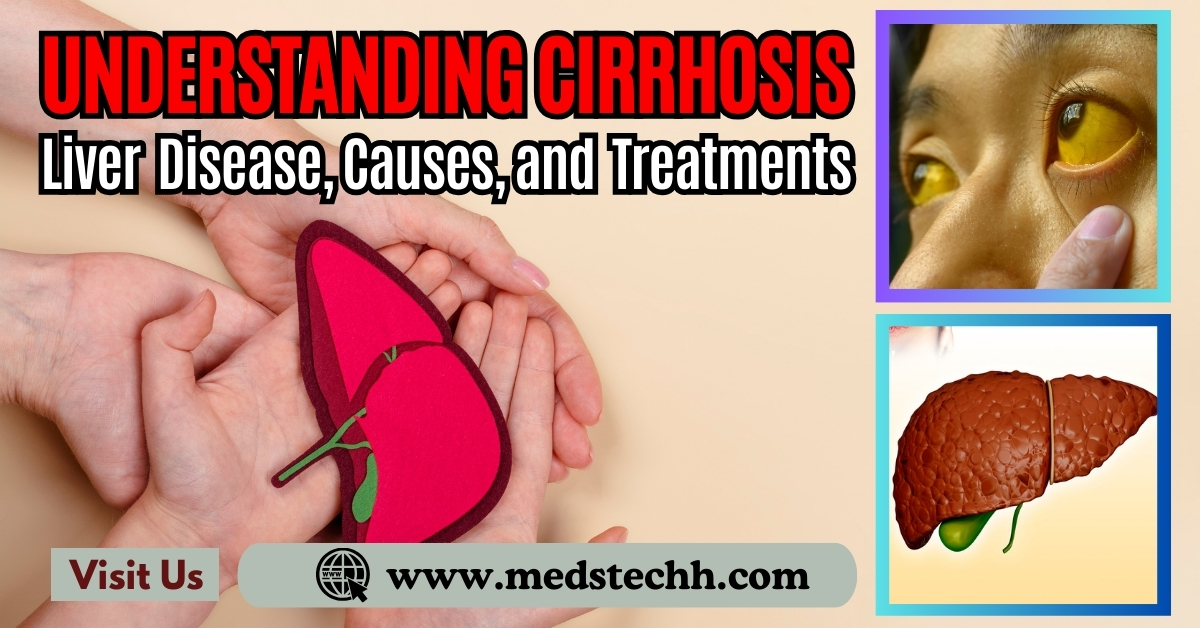The liver plays a crucial role in the body, overseeing a range of essential functions such as detoxification, metabolism, and the storage of nutrients. However, when the liver undergoes chronic damage, it can lead to a condition called cirrhosis, which significantly impairs its function and can be life-threatening if left untreated.
What is Cirrhosis?
Cirrhosis is a late stage of scarring (fibrosis) of the liver caused by many forms of liver diseases and conditions, such as hepatitis and chronic alcoholism. As the liver becomes increasingly scarred, it loses its ability to function properly, leading to severe complications.
Causes of Cirrhosis:
Several factors can contribute to the development of cirrhosis, including chronic alcohol abuse, hepatitis infections (particularly hepatitis B and C), fatty liver disease, and autoimmune liver diseases. Additionally, certain genetic disorders and prolonged exposure to toxins can also lead to cirrhosis.
Progression of Cirrhosis:
Cirrhosis typically progresses slowly over many years, often without noticeable symptoms in the early stages. However, as the scarring worsens, the liver’s ability to perform its vital functions diminishes, leading to various complications.
Types of Liver Cirrhosis
- Alcoholic Cirrhosis:
Alcoholic cirrhosis is the most common type of cirrhosis and is caused by chronic alcohol abuse. Prolonged alcohol consumption damages liver cells, leading to inflammation and scarring of the liver tissue.
- Non-alcoholic Fatty Liver Disease (NAFLD):
Non-alcoholic fatty liver disease (NAFLD) is another common cause of cirrhosis, especially in individuals who are overweight or obese. It is characterized by the accumulation of fat in the liver, which can progress to inflammation and scarring.
- Hepatitis B and C-related Cirrhosis:
Chronic infection with hepatitis B or C viruses can cause inflammation and damage to the liver over time, eventually leading to cirrhosis if left untreated. These viral infections are a significant risk factor for liver cirrhosis worldwide.
Symptoms of Cirrhosis:
The signs of cirrhosis can differ based on how serious the condition is. In the early stages, individuals may experience fatigue, weakness, and loss of appetite. As cirrhosis progresses, symptoms may include jaundice (yellowing of the skin and eyes), abdominal swelling, easy bruising or bleeding, and mental confusion.
- Early Signs:
Early signs of cirrhosis may include fatigue, weakness, and a decreased appetite. However, these symptoms are often nonspecific and may be attributed to other causes, making early detection challenging.
- Advanced Symptoms:
Advanced cirrhosis can manifest with more severe symptoms, such as jaundice, abdominal swelling (ascites) and confusion or difficulty concentrating due to hepatic encephalopathy.
Diagnosing Cirrhosis:
Diagnosing cirrhosis typically involves a combination of medical history assessment, physical examination, and diagnostic tests. These may include blood tests, imaging studies (such as ultrasound or MRI), and liver biopsy.
- Medical Tests and Procedures:
Blood tests can detect abnormalities in liver function, such as liver function test, hepatitis screening test, while imaging studies can visualize the liver’s structure and identify signs of scarring. A liver biopsy might be conducted to verify the diagnosis and evaluate the level of liver injury.
- Importance of Early Detection:
Early detection of cirrhosis is crucial for implementing interventions to slow disease progression and prevent complications. Routine screenings for liver disease risk factors, such as alcohol abuse or viral hepatitis, can help identify individuals at risk of developing cirrhosis.
Treatment Options:
Treatment for cirrhosis aims to manage symptoms, prevent complications, and slow disease progression. Depending on the underlying cause and severity of cirrhosis, treatment options may include lifestyle modifications, medications, and, in some cases, surgical interventions.
- Lifestyle Changes:
Lifestyle modifications, such as abstaining from alcohol, maintaining a healthy weight, and following a balanced diet, are essential for managing cirrhosis and preventing further liver damage.
- Medications:
Medications may be prescribed to manage specific symptoms of cirrhosis or address underlying causes, such as antiviral drugs for hepatitis B or C infection, diuretics for fluid retention, or medications to reduce portal hypertension.
- Surgical Interventions:
In advanced cases of cirrhosis, surgical interventions such as liver transplantation may be necessary to replace the damaged liver with a healthy one from a donor.
Prevention Methods:
Preventing cirrhosis involves adopting healthy lifestyle habits, receiving appropriate vaccinations, and undergoing regular medical screenings to detect liver disease early.
- Healthy Habits
Avoiding excessive alcohol consumption, maintaining a healthy weight, and practicing safe sex to prevent hepatitis infection are essential for reducing the risk of cirrhosis.
- Vaccinations
Vaccinations for hepatitis A and B can prevent these viral infections, which are common causes of cirrhosis.
- Regular Screenings
Routine screenings for liver disease risk factors, such as viral hepatitis or fatty liver disease, can help identify individuals at risk of developing cirrhosis and allow for early intervention.
Cirrhosis and Alcohol:
Chronic alcohol abuse is a leading cause of cirrhosis, highlighting the importance of alcohol moderation or cessation for individuals at risk.
- Relationship between Alcohol Consumption and Cirrhosis:
Excessive alcohol consumption can lead to liver inflammation, fatty liver disease, and ultimately cirrhosis if left unchecked.
- Tips for Alcohol Moderation or Cessation:
Seeking support from healthcare professionals, joining support groups, and finding alternative coping mechanisms can help individuals reduce or eliminate alcohol consumption and protect liver health.
Cirrhosis and Diet:
Maintaining a nutritious diet is essential for supporting liver function and managing symptoms of cirrhosis.
- Importance of a Balanced Diet:
A balanced diet rich in vitamins, minerals, and antioxidants can help reduce inflammation, support liver regeneration, and improve overall health.
- Foods to Avoid and Include:
Avoiding processed foods, excessive salt, and alcohol while incorporating whole foods, lean proteins, and healthy fats can promote liver health and alleviate symptoms of cirrhosis.
Cirrhosis and Exercise:
Regular physical activity can benefit individuals with cirrhosis by improving circulation, strengthening muscles, and boosting overall well-being.
- Benefits of Regular Physical Activity:
Exercise can help reduce the risk of complications associated with cirrhosis, such as muscle wasting, fatigue, and insulin resistance.
Cirrhosis and Mental Health:
Living with cirrhosis can have a significant impact on mental well-being, leading to feelings of stress, depression, and anxiety. It is essential to address these emotional challenges and seek support to maintain overall quality of life.
Conclusion
Cirrhosis is a serious condition that can significantly impact an people health and quality of life. By understanding the causes, symptoms, and treatment options for cirrhosis, individuals can take proactive steps to manage the condition and prevent complications. Seeking regular medical care, adopting healthy lifestyle habits, and accessing support resources can empower individuals with cirrhosis to live fulfilling lives despite the challenges they may face.
Unique FAQs
- Is cirrhosis reversible?
While early-stage cirrhosis may be reversible with prompt intervention, advanced cirrhosis typically cannot be cured. However, treatment can help manage symptoms and prevent further liver damage.
- Can cirrhosis be prevented?
Adopting a healthy lifestyle, receiving vaccinations for hepatitis, avoiding excessive alcohol consumption, and undergoing regular medical screenings can reduce the risk of developing cirrhosis.
- How can I prevent liver cirrhosis if I have hepatitis?
If you have hepatitis, it’s essential to follow your healthcare provider’s recommendations for managing the condition, including taking antiviral medications if prescribed. Avoiding alcohol and maintaining a healthy lifestyle can also help protect your liver from further damage.
- Can cirrhosis be treated without surgery?
Yes, cirrhosis can be managed with medications, lifestyle modifications, and other non-surgical interventions. However, in severe cases, liver transplantation may be necessary.
- Are there any alternative therapies for cirrhosis?
While some alternative therapies may offer symptom relief or support overall health, it’s essential to consult with a healthcare professional before trying any alternative treatments for cirrhosis.




Heya i am for the first time here. I came across this board and I find It really useful & it helped me out a lot. I hope to give something back and aid others like you helped me.
It is the best time to make some plans for the future and it is time to be happy. I have read this post and if I could I want to suggest you few interesting things or tips. Maybe you could write next articles referring to this article. I wish to read even more things about it!
This is really interesting, You’re a very skilled blogger. I’ve joined your feed and look forward to seeking more of your wonderful post. Also, I’ve shared your site in my social networks!